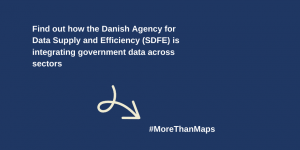Danish Agency for Data Supply and Efficiency (SDFE)
“Being in the core data business, we are committed to use our data and knowledge to support policy development. We are working to support the 2030 Agenda and the Paris Agreement with specific national initiatives. Our new strategy considers the challenges of climate change and addresses the need to modernise public administration to keep up with the challenges. To support the major transitions happening in society, we believe that data must be interoperable and freely available for use and reuse across public authorities and sectors.”
Kristian Møller, Director General, Agency for Data Supply and Efficiency (SDFE)
The Agency for Data Supply and Efficiency (SDFE)'s commitment to deal with important societal challenges, supported by its new strategy, leads it to public sector programmes outside of the geospatial domain, while building on its geospatial “heritage". This has resulted in a close cooperation with the energy and utility sector, and two recent examples showcase its role as data integrators across the public sector.
Supporting the Danish Climate Act on reducing carbon emission by 70% in 2030, SDFE has brought data and knowledge to the table, and through a combination of core data and sector specific data, created new instruments to deal with climate change.
In 2020 a new Utility Portal which provides easier access to utility data across Denmark, was launched in a cooperation between the Ministry of Climate, Energy and Utility and the three data owners. SDFE is responsible for the operation of the portal. It will collect a number of different data about and from the utility sector. Initially, economic key figures for electricity distribution and water utility as well as technical data on energy-producing units. The portal will be extended with more data sets on the utility sector on an ongoing basis.
Benefits
- The portal will improve transparency in the utility sectors through better access to data in a common format, while at the same time facilitating the tasks of the authorities by a single access to data.
- For authorities the portal will be a significant contribution supporting their endeavor to coordinate and optimise utilities across Denmark.
- The open distribution of utility sector data will also help to create a breeding ground for innovation and new business models in both the public and private sectors.
Another recent initiative is the Building Hub, which aims to collect and disseminate data on buildings and their energy consumption in order to create a stronger basis for the implementation of energy efficiency improvements in buildings. Information on energy consumption, building construction and weather will be part of the data collected for calculations.
Benefits
- The Hub will directly support energy efficiency in society as well as in public buildings, utilization of flexible consumption and reduction of the buildings' climate footprint. The value in a socio-economic perspective is estimated up to €50 million per year.
- The citizens (building owners) get easier access to data via the hub, providing information how to make the building more efficient and what potentials the building has to offer in relation to flexible energy consumption.
- Companies can use data for targeted offers for the implementation of efficiencies for building owners, as well as better data for developing new solutions for energy efficiency and climate improvement of buildings.
- Authorities will be able to create better framework conditions for promoting energy efficiency in society in general as well as for public buildings - reducing carbon emissions

